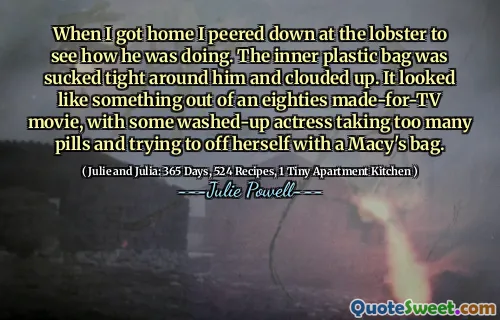
When I got home I peered down at the lobster to see how he was doing. The inner plastic bag was sucked tight around him and clouded up. It looked like something out of an eighties made-for-TV movie, with some washed-up actress taking too many pills and trying to off herself with a Macy's bag.
This quote evokes a vivid and somewhat darkly humorous image that immediately captures attention through its unusual comparison. The author, Julie Powell, uses an unexpected metaphor to describe the state of a lobster inside a plastic bag, likening it to a dramatic and tragic scene from an eighties made-for-TV movie. This reference not only paints a life-like picture of the described situation but also brings a dramatic flair and a layer of melancholy humor to an otherwise mundane moment.
The juxtaposition of the lobster's helplessness and the image of a washed-up actress struggling with personal demons adds a complexity that is both poignant and a little unsettling. It sheds light on themes of entrapment and desperation, cleverly masked within the everyday act of bringing home seafood. This metaphor gives the reader a glimpse into the author's worldview, one that finds dark humor and dramatic narrative in small, overlooked moments.
Furthermore, the choice of words like "sucked tight" and "clouded up" evokes a sense of suffocation or entrapment, which is echoed in the comparison to the actress's tragic act. This might hint at the author's contemplation on vulnerability, mortality, or the often-overlooked dramas in everyday life. From a stylistic point of view, the quote is an excellent example of how creative language and vivid imagery can turn an ordinary observation into a memorable and thought-provoking passage.
In sum, the quote effectively combines humor, sadness, and vivid imagery to engage the reader, invite reflection, and add depth to an otherwise simple moment in life.






